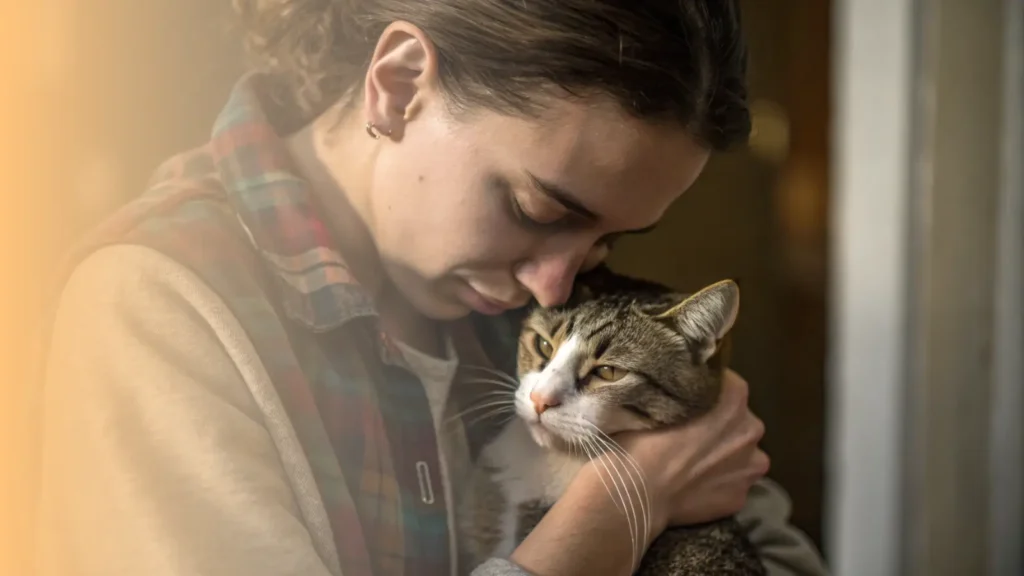Facing the progression of a chronic illness like Inflammatory Bowel Disease (IBD) in your beloved cat is an incredibly painful journey.
As their dedicated caregiver, the thought of euthanasia is likely the hardest decision you will ever confront, yet it can also be the most compassionate act to end unmanageable suffering.
Understanding when that difficult time might be approaching is a heavy burden, but you are not alone in navigating these sensitive considerations.
Recognizing When Suffering Becomes Too Much
One of the most challenging aspects is trying to see the world through your cat’s eyes, especially since they are masters at hiding discomfort.
However, several signs can indicate that your cat’s suffering from IBD may have become overwhelming, and their quality of life is persistently poor despite everyone’s best efforts.
1. Persistent Poor Quality of Life
You know your cat best. If you find that their bad days, filled with discomfort and a lack of interest in their usual joys, consistently outnumber the good days, their overall quality of life is likely compromised.
Perhaps they no longer greet you with a happy chirp or show interest in that favorite feather toy.
The “Five Favorite Things” method, where you list activities your cat loved when healthy, can be a helpful guide; if they no longer willingly participate in most of these, it is a significant indicator.
2. Uncontrolled and Debilitating Symptoms
Despite trying various treatments, if chronic and severe vomiting or diarrhea continues relentlessly, it takes a huge toll.
If these symptoms no longer respond adequately to medications or dietary changes, making it impossible for your cat to maintain hydration, nutrition, or even cleanliness, their suffering is likely profound.
Constant clean-ups can also impact their dignity, especially if it causes them distress.
3. Severe Weight Loss and Frailty
You might notice your cat becoming extremely thin, with significant muscle wasting, a condition known as cachexia.
This can happen even if you are doing everything possible to encourage them to eat or provide nutritional support.
This extreme weight loss often signals severe malabsorption due to the IBD and a body that is struggling to cope.
4. Chronic and Unmanageable Pain
Persistent pain is a clear sign of suffering. This might show as constant vocalizing, hiding away more than usual, uncharacteristic aggression, or a reluctance to be touched or move.
A cat in pain might adopt a hunched posture or seem unable to get comfortable. If available pain management strategies are no longer providing adequate relief, their discomfort is likely continuous.
5. Inability to Eat or Drink Adequately
If your cat consistently refuses all food and water, or cannot keep anything down due to persistent nausea or vomiting, their body cannot sustain itself.
This leads to profound weakness, dehydration, and a continued decline in their physical condition, making any form of comfort very hard to achieve.
6. Profound Withdrawal or Loss of Dignity
A cat who is deeply suffering might become profoundly withdrawn, showing no interest in their environment, human interaction, or any of their previous sources of pleasure.
It can sometimes feel like they have “given up.”
For some cats and their families, the inability to control urination or defecation, leading to constant soiling, also significantly impacts their sense of dignity and well being.
Lap of Love Veterinary Hospice highlights specific crisis points such as a complete stop in eating, uncontrollable vomiting or diarrhea, a bloated abdomen, difficulty breathing, or vocalizing in severe pain as indicators of end stage suffering.
When Treatments No Longer Offer Relief
The heartbreaking decision to consider euthanasia often comes into focus when IBD becomes refractory, meaning it no longer responds to treatments, or when the burdens of treatment seem to outweigh any potential benefits for your cat’s quality of life.
1. Exhausting Therapeutic Options
You and your vet may have diligently tried various dietary interventions, first line medications like corticosteroids, and even second line or more potent immunosuppressants like chlorambucil.
If, despite these comprehensive efforts, your cat does not achieve sustained clinical remission or an acceptable quality of life, or if the side effects of necessary medications become intolerable, further aggressive treatment might not be in their best interest.
2. Dealing with Serious Complications
Sometimes, IBD can lead to severe, untreatable complications.
This might include severe protein losing enteropathy (PLE), where the gut loses so much protein that it causes fluid accumulation and profound weakness.
Another devastating scenario is the confirmed progression of IBD to a high grade, aggressive form of intestinal lymphoma, which carries a poor prognosis even with chemotherapy.
3. When the Burden of Treatment is Too High
The process of administering treatments, like frequent medications (especially if your cat finds pilling stressful), regular veterinary visits, or intensive home care, can sometimes cause significant stress, fear, or anxiety for your cat.
If these interventions themselves are diminishing their quality of life, it is an important factor to consider.
Your own capacity to provide this intensive care, emotionally and physically, is also a valid part of the larger picture.
Making This Difficult Choice With Your Vet
This is not a decision you have to make in isolation. Your veterinarian is a crucial partner in this process, offering medical insight and compassionate support.
1. The Value of Shared Decision Making
An open and honest conversation with your treating veterinarian is so important.
They can provide a clear assessment of your cat’s current condition, the likely prognosis with or without further intervention, and an objective, yet empathetic, perspective on their quality of life.
This collaborative approach helps ensure your decision is as informed and considered as possible.
2. Considering Your Cat’s Best Interests
Ethical principles guide veterinarians to act in your cat’s best interests, prioritizing their well being and alleviating suffering (beneficence), while avoiding actions where burdens outweigh benefits (non maleficence).
Sometimes, the kindest act is to prevent further suffering when a good quality of life can no longer be maintained.
It is okay to feel a wide range of emotions like grief, sadness, and guilt; these are a natural part of this loving process.
3. Understanding the Question of Timing
One of the most agonizing aspects for any pet parent is figuring out the “right” time. There is rarely a single perfect moment.
However, many who have walked this path express that it is often kinder to make this compassionate decision a little “too early” while your cat still has some dignity and is not in extreme distress, rather than a moment “too late,” after they have endured undeniable and prolonged suffering.
The goal is to prevent their worst days. While the idea of a “natural death” is understandable, for a chronic illness like advanced IBD, it can involve significant and extended suffering.
Euthanasia, when performed at the appropriate time, is a peaceful medical procedure designed to prevent that.
Focusing on Comfort in Their Final Chapter
It is important to know that even as you consider this path, the focus can shift entirely to comfort.
Palliative and hospice care approaches are dedicated to alleviating symptoms like pain and nausea, ensuring your cat feels as peaceful and comfortable as possible in their final days or weeks.
Your veterinarian can guide you on these options, ensuring your cat is surrounded by love and free from distress.
Final Thoughts
The decision to euthanize your cat with IBD is a profound act of love and responsibility, made to end unmanageable suffering.
By working closely with your veterinarian and focusing on your cat’s quality of life, you can navigate this incredibly difficult choice with the knowledge that you are prioritizing their peace and dignity.







